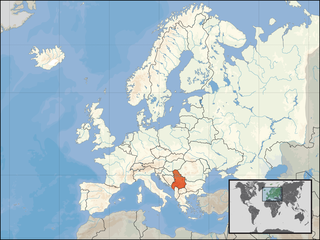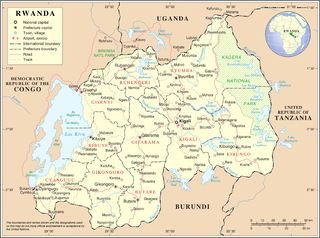
The International Criminal Tribunal for the former Yugoslavia (ICTY) was a body of the United Nations that was established to prosecute the war crimes that had been committed during the Yugoslav Wars and to try their perpetrators. The tribunal was an ad hoc court located in The Hague, Netherlands.

The member states of the United Nations comprise 193 sovereign states. The United Nations (UN) is the world's largest intergovernmental organization. All members have equal representation in the UN General Assembly.

United Nations Security Council resolution 1244, adopted on 10 June 1999, after recalling resolutions 1160 (1998), 1199 (1998), 1203 (1998) and 1239 (1999), authorised an international civil and military presence in the Federal Republic of Yugoslavia and established the United Nations Interim Administration Mission in Kosovo (UNMIK). It followed an agreement by Yugoslav President Slobodan Milošević to terms proposed by President of Finland Martti Ahtisaari and former Prime Minister of Russia Viktor Chernomyrdin on 8 June, involving withdrawal of all Yugoslav state forces from Kosovo.

United Nations Security Council resolution 777, adopted unanimously on 19 September 1992, after reaffirming Resolution 713 (1992) and all subsequent resolutions on the topic, the Council considered that, as the state known as the Socialist Federal Republic of Yugoslavia (SFRY) had ceased to exist, it noted that under Resolution 757 (1992), the claim by the Federal Republic of Yugoslavia to continue automatic membership in the United Nations was not widely accepted and so determined that membership of the SFRY in the United Nations could not continue. Therefore, the Council recommended to the General Assembly that the Federal Republic of Yugoslavia cease participation in the General Assembly and apply for membership in the United Nations.

United Nations Security Council resolution 1104, adopted unanimously on 8 April 1997, after recalling 808 (1993) and 827 (1993) and considering the nominations for Judges of the International Criminal Tribunal for the former Yugoslavia received by the Secretary-General Kofi Annan by 13 March 1997, the council established a list of candidates in accordance with Article 13 of the Statute of the International Tribunal to be forwarded to the General Assembly.

United Nations Security Council resolution 1191 was adopted unanimously on 27 August 1998. In it, after recalling resolutions 808 (1993), 827 (1993) and 1166 (1998), the Council forwarded a list of nine nominations for judges at the International Criminal Tribunal for the former Yugoslavia (ICTY) to the General Assembly for consideration.

United Nations Security Council resolution 1200, adopted unanimously on 30 September 1998, after recalling resolutions 955 (1994), 989 (1995) and 1165 (1998), the Council forwarded 18 nominations for judges at the International Criminal Tribunal for Rwanda (ICTR) to the General Assembly for consideration.

United Nations Security Council resolution 1340, adopted unanimously on 8 February 2001, after recalling resolutions 808 (1993), 827 (1993), 1166 (1998) and 1329 (2000), the Council forwarded a list of nominees for permanent judges at the International Criminal Tribunal for the former Yugoslavia (ICTY) to the General Assembly for consideration.

United Nations Security Council resolution 1347, adopted unanimously on 30 March 2001, after recalling resolutions 955 (1994), 1165 (1998) and 1329 (2000), the Council forwarded a list of nominees for permanent judges at the International Criminal Tribunal for Rwanda (ICTR) to the General Assembly for consideration.

United Nations Security Council resolution 1350, adopted unanimously on 27 April 2001, after recalling resolutions 808 (1993), 827 (1993), 1166 (1998) and 1329 (2000), the Council forwarded a list of nominees for permanent judges at the International Criminal Tribunal for the former Yugoslavia (ICTY) to the General Assembly for consideration.

United Nations Security Council resolution 1449, adopted unanimously on 13 December 2002, after recalling resolutions 955 (1994), 1165 (1998), 1329 (2000), 1411 (2002) and 1431 (2002), the Council forwarded a list of nominees for permanent judges at the International Criminal Tribunal for Rwanda (ICTR) to the General Assembly for consideration.

United Nations Security Council resolution 1477, adopted unanimously on 29 April 2003, after recalling resolutions 955 (1994), 1165 (1998), 1329 (2000), 1411 (2002) and 1431 (2002), the Council forwarded a list of nominees for permanent judges at the International Criminal Tribunal for Rwanda (ICTR) to the General Assembly for consideration.

United Nations Security Council resolution 1581, adopted unanimously on 18 January 2005, after recalling resolutions 1503 (2003) and 1534 (2004), the Council approved the extension of the terms of office of seven short-term judges at the International Criminal Tribunal for the former Yugoslavia (ICTY) in order to allow them to finish adjudicating the cases on which they had been working. It was the first Security Council resolution adopted in 2005.

United Nations Security Council Resolution 1954, adopted unanimously on December 14, 2010, after recalling resolutions 827 (1993), 1581 (2005), 1597 (2005), 1613 (2005), 1629 (2005), 1660 (2006), 1668 (2006), 1800 (2008), 1837 (2008), 1849 (2008), 1877 (2009), 1900 (2009) and 1931 (2010), the Council permitted two judges to serve beyond their term of office to enable them to complete work on cases in which they were involved at the International Criminal Tribunal for the former Yugoslavia (ICTY).

United Nations Security Council resolution 1597, adopted unanimously on 20 April 2005, after recalling resolutions 827 (1993), 1166 (1998), 1329 (2003), 1411 (2002), 1431 (2002), 1481 (2003), 1503 (2003) and 1534 (2004), the Council amended the statute of the International Criminal Tribunal for the former Yugoslavia (ICTY) in order to allow temporary judges to be re-elected.

United Nations Security Council Resolution 1613, adopted unanimously on 26 July 2005, after recalling resolutions 827 (1993), 1166 (1998), 1329 (2000), 1411 (2002), 1431 (2002), 1481 (2003), 1503 (2003), 1534 (2004) and 1597 (2005), the Council forwarded a list of nominees for temporary judges at the International Criminal Tribunal for the former Yugoslavia (ICTY) to the General Assembly for consideration.

United Nations Security Council resolution 1629, adopted unanimously on 30 September 2005, after considering the Statute of the International Criminal Tribunal for the former Yugoslavia (ICTY), the Council decided that Judge Christine Van Den Wyngaert could participate in the Mile Mrkšić case, before her elected term as permanent judge of the Tribunal had begun.

United Nations Security Council Resolution 1660, adopted unanimously on February 28, 2006, after recalling resolutions 827 (1993), 1166 (1996), 1329 (2000), 1411 (2002), 1431 (2002), 1481 (2003), 1503 (2003), 1534 (2004) and 1597 (2005), the Council amended the statute of the International Criminal Tribunal for the former Yugoslavia (ICTY) concerning the appointment of reserve judges.

United Nations Security Council Resolution 1684, adopted unanimously on June 13, 2006, after recalling resolutions 955 (1994), 1165 (1998), 1329 (2000), 1411 (2002), 1431 (2002), 1449 (2002), 1503 (2003) and 1534 (2004) concerning the International Criminal Tribunal for Rwanda (ICTR), the Council extended the terms of 11 judges beyond their expiry dates in order for them to complete the trials in which they were sitting.

United Nations Security Council Resolution 1993, adopted unanimously on June 29, 2011, after recalling resolutions 827 (1993), 1503 (2003) and 1534 (2003), the Council extended the terms of office of 17 permanent and temporary judges at the International Criminal Tribunal for the former Yugoslavia (ICTY).

















